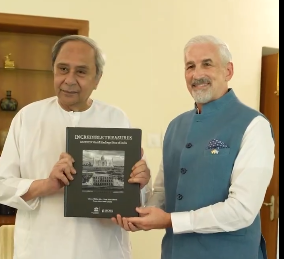Bhubaneswar: In a meeting with Chief Minister Naveen Patnaik Tuesday, the United Nations Resident Coordinator in India Shombi Sharp lauded state government’s initiatives towards food security and disaster management and said they are globally recognised.
Taking to X, the CM said, “Pleasure meeting Shombi Sharp, UN Resident Coordinator in India. Thank him for his appreciation for Odisha’s global model of disaster management, pioneering work in food security, 5T governance and Odisha Millets Mission (OMM).” During the interaction, Sharp said, “We in the UN are so privileged to be working with you. We have had a long history of fantastic work on disaster reduction and you are making incredible progress on the human development indicators. We saw the 5T and you have been recognised globally for the work on food security. Also OMM is noteworthy.”
The state government last year announced that the State Food Security Scheme (SFSS) will be extended by five more years till December 31, 2028. The proposal was approved by the CM. Earlier, the beneficiaries were entitled to get five kg of free rice till December 31, 2023. A total of 9,97,055 people from 3,14,923 families in the state are covered under the SFSS.
The state is currently more resilient in facing natural disaster. Years of planning and preparation paid off, as fatalities from powerful cyclones never crossed double digits. When cyclone Phailin struck the coast in 2013, the state carried out one of the most successful disaster management efforts in the world, evacuating close to one million people ahead of the strongest cyclone to hit the country, since the Super Cyclone. In 2019, when another powerful cyclone Fani struck, the state government showed a high degree of preparedness and effectively evacuated around 1.2 million people.
In 1999, in the wake of the Super Cyclone, Odisha became the first state in India to establish a disaster management authority. In fact, the body, now known as the Odisha State Disaster Management Authority (OSDMA), was set up well before the establishment of the National Disaster Management Authority (NDMA) in 2005. Importantly, the state departed from the conventional approach to disaster management by placing local communities at the heart of the effort.
Arindam Ganguly, OP







































